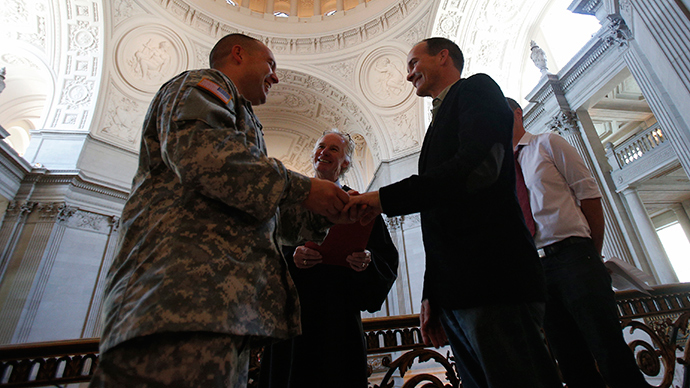Pentagon changes LGBT policy to strengthen national security

The DoD has extended its anti-discrimination protection mechanism to gay and lesbian troops, arguing that not doing so undermines national security. The rules that allow medical discharges of transgender people remain in place.
The change was announced this week by Defense Secretary Ashton Carter as he kicked off the military LGBT Pride Month.
"We need to be a meritocracy. We have to focus relentlessly on our mission, which means the things that matter most about a person is what they can contribute to national defense," Carter said at a standing-room-only event. "We must ensure that everyone who is able and willing to serve has the full and equal opportunity to do so. We must start from a position of inclusivity, not exclusivity."
"Anything less," he added, "is not just plain wrong, it's bad defense policy that puts our future strength at risk."
Moderating the event was Army Brigadier General Randy Taylor, a decorated commander, who is openly gay. He told how covering his sexual orientation most of his career was a struggle for himself and his partner Lucas during multiple tours of duty in Iraq, Somalia, Haiti and Afghanistan.
READ MORE: British Army’s first transgender officer plea: Don’t ‘sensationalize’ her story
The Pentagon discarded its long-standing “don’t ask, don’t tell” policy that banned openly gay people from serving in the US armed forces in 2011 and has since been introducing further changes to make the LGBT community feel at home in the service. The first Pride event was held in 2012 by then-Secretary Leon Panetta.
The latest change announced by Carter offers gay troops protection under the Military Equal Opportunity program. The same office handles complaints of discrimination based on race, color, religion, sex or national origin. Previously gays had to file discrimination complaints with the Inspector General’s Office.
However, the addition of sexual orientation wording to the equal opportunity policy doesn’t extend to gender. The military may still seek discharges of transgender troops for medical reasons.
Making the case for transgender people at the event was Amanda Simpson, executive director of the Army Office of Energy Initiatives, who was an openly transgender political appointee in the US and the highest transgender official in the Pentagon. She said she has her post not because of her gender but "because I happen to be the best person to do the job."












